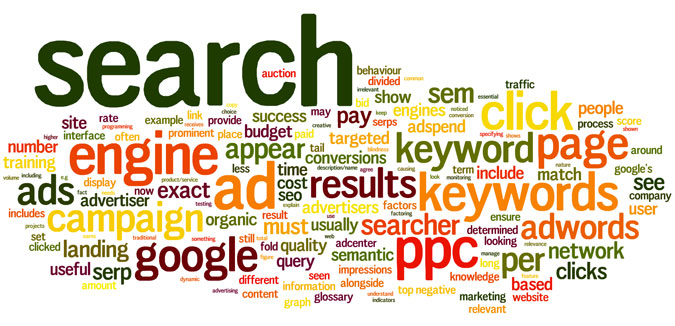Aaron Charlie
26 Jul 2012
AdWords Terms Glossary - Know Your PPC From Your CPC
Last year we wrote our SEO Glossary, which covered all the important terms you need to know when running an SEO campaign. In that glossary we mentioned that PPC (Pay Per Click) is "where digital advertisers pay for their web pages to appear in a prominent place on a SERP for targeted keywords. Advertisers pay every time a user clicks."
Now that our Google AdWords course has been firmly established alongside our SEO training, we think it’s time to provide a glossary for Paid Search as well! After all, studies show that clicks on Google Ads are nearly double organic clicks for searches with high commercial intent (this post on Search Engine Land has more to explain the significance of this).

Glossary of AdWords Terms
A/B Testing
Once visitors have clicked on your Ad, A/B testing means taking them to different versions of your landing page to see how their behaviour differs.
Above the Fold
Taken from traditional print media, this term refers to the fact that the higher the information (Ad) appears, the more likely it is to be noticed. ‘Below the fold’ in SERPs/websites is anything that must be scrolled down to see.
Ad
The advertisement seen by the searcher as a result of typing a specific query into a search engine
AdCenter
The Microsoft version of Google AdWords, with results that appear in Bing SERPs and around the web.
AdWords
Google’s link auction network; based on targeted Ads paid for by advertisers on a PPC basis.
AdWords Keyword Tool
A quick and useful reference of how competitive keywords are, and their search volume.
AdSpend
The total budget set for PPC SEM.
Ad Copy
The body text of the Ad, as seen in the SERP (Search Engine Results Page).
Banner Blindness
Caused by user experience of irrelevant Ads appearing in the SERPs. The behaviour of skipping past the paid Ads is ongoing, even though they are now more targeted to the search term used.
Bid
The maximum amount that an advertiser is willing to pay per click.
Broad Keywords
Very general (usually 1 or 2 word) keywords that are searched for often.
Content Network
Sites that agree to show Ads, e.g. Google Adsense, or Microsoft’s AdCenter network.
Conversion
The website’s goal, e.g. a sale or completed contact form is tracked to measure the success of the SEM campaign. Here's some more on how to set up a goal in Google Analytics.
CPC (Cost Per Click)
The stated amount the advertiser pays each time a searcher clicks on their Ad.
CTR (Click Through Rate)
Usually expressed as a percentage. This is the number of people who clicked on the Ad divided by the number of Impressions.
Entry Page – see Landing Page.
EPC (Earnings Per Click)
How much a company earns overall for each click from an Ad (clicks divided by monetary value of conversions).
Exact Match Keyword
Useful if your product description/name is similar to something completely different. Specifying that you want Exact Match Keywords means your Ads should be more targeted, and will usually still include common spelling errors. For more on Exact Match/Broad Match Keywords, have a look at the “tennis shoes” search query example on Google Support.
Geotargeting
Factoring the location of the searcher into the choice of whether to display certain Ads.
Impressions
The number of times a page displaying the Ad was shown.
Keyword
The phrase typed into a search engine by the user. Research into the keywords people use when looking for a product/service you can provide is fundamental to all SEM.
KPI (Key Performance Indicators)
Objectives that must be set to monitor and evaluate the success of the PPC campaign.
Landing Page
The first place people arrive on your site after clicking on an Ad. Must be optimised to fulfil their needs and encourage conversions. Must also be written/designed in such a way to help search engines understand the nature of your website.
Long Tail Keywords
For example, “buy gold wedding rings online” as opposed to “wedding rings”. Long tail keywords cost less per click because they are used less by searchers.
Negative Keyword
Included to ensure the Ad doesn’t show for products the brand doesn’t offer. E.g. a business skills training company may include “training” as a keyword but “fitness training” as a negative keyword.
Organic Search Results
The natural listings that appear below the Ads.
Paid Search Results
Any result to a query that a business has paid for, usually appearing above and to the right of organic results.
PPC (Pay Per Click)
Advertisers pay for their listing to appear at the top of a SERP (or other prominent place), but only pay when their Ad is clicked on.
Quality Score
Determined by the search engine, the quality score is assigned to a website based on factors including click through rate and relevance of landing page. Google wants to keep its results relevant and useful to the searcher and that includes PPC.
ROI (Return on Investment)
Constant monitoring of the success of your PPC campaign is essential to ensure you receive more money through traffic and conversions as a result of AdSpend.
Rotation
How often your Ad will appear in the SERP for the relevant search terms.
SEO (Search Engine Optimisation)
The process of making a site appear at the top of organic search rankings, alongside or instead of a PPC campaign.
SERP
Search Engine Results Page.